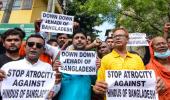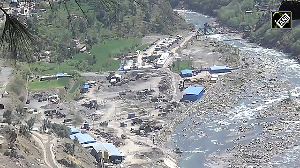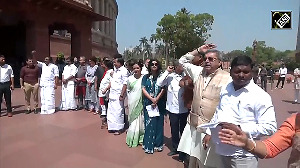With Bangladesh descending into chaos, Prime Minister Sheikh Hasina surreptitiously fled the country for London in a military aircraft on Monday and the army stepped in to fill the power vacuum, ending one uncertain chapter and opening another in the nation's restive history.

As news of Hasina's departure spread, hundreds broke into Hasina's residence, vandalising and looting the interiors, providing dramatic expression to the anti-government protests that have killed more than 100 people in the last two days. At the centre of people anger is the Hasina government's controversial quota system reserving 30 per cent jobs for families of veterans who fought the 1971 liberation war.
With volatile crowds taking to the streets -- some clambering on Hasina's father and Bangladesh founder Sheikh Mujibur Rahman's statue and smashing it with hammers in a lasting image underscoring the fickleness of history -- Army chief General Waqar-uz-Zaman announced that the 76-year-old prime minister has resigned.
An interim government will be taking over, he said in a televised address amid feverish speculation about where Hasina was headed.
"I'm taking all responsibility (of the country). Please cooperate," Zaman added, signalling the end of Hasina's 15-year power run.
The Army chief said he had met political leaders and told them the Army would take over responsibility for law and order. However, there were no leaders from Hasina's Awami League party at the meeting.
As protests spiralled across the country, the army chief said he had asked both Army and police not to fire any shots.
Zaman also urged restraint and asked protesters to end the violence. He vowed "justice" for all the people.
After hours of uncertainty in a day of sudden developments, Hasina landed at the Hindon airbase in Ghaziabad near New Delhi on her way to London, diplomatic sources in the Indian capital said. She arrived in India in a C-130J military transport aircraft of the Bangladesh Air Force.
She is likely to meet her daughter Saima Wazed, who is based in Delhi and working as the WHO's regional director for South-East Asia.
Back home in Dhaka, restive crowds, their protests giving way to jubilation that the Hasina rule had ended, swarmed the airport and even spilled into the runway. The Indira Gandhi Cultural Centre in the city's Dhanmondi area was damaged. Four Hindu temples suffered "minor" damages across the country, eyewitnesses and a community leader said.
The Bangabandhu memorial museum -- dedicated to Mujibur Rahman who was assassinated along with his wife and their three sons while serving as president in 1975 -- was also vandalised. Hasina and her sister Sheikh Rehana had survived the purge as they were abroad. Hasina then spent six years in exile in India.
The home of Dr Wajed Miah, Hasina's husband, was not spared either in the vortex of violence on Monday, local reports said.
From Ganabhadan, the prime minister's official residence, came extraordinary visuals of protesters storming in and walking away with sofas and even chairs.
A man held aloft his child, hundreds broke in dance to the beating of drums, and one protester proudly proclaimed to the media that he had taken a red lipstick. “I will keep it as a memento of our struggle -- to remember we broke free from a dictator. She used to wear this lipstick,” he said.
Another young man carrying a planter said, “This is freedom. I can't put this feeling into words.”
The Bangladesh flag draped around his neck, a protester said he was 35 years old and had not been able to cast his vote for three elections.
With crowds on a fiery rampage through the country -- a charred vehicle on a Dhaka street testimony to the violence -- the Awami League office in the capital was set on fire. Home Minister Asaduzzaman Khan's house was ransacked. And a Prothom Alo reporter said screams and loud noises could be heard when several people entered the chief justice's residence.
The violence was not restricted to Dhaka. In the eastern city of Sylhet, offices of the deputy commissioner and superintendent of police were reportedly set on fire, while the homes of several councillors were attacked, BBC reported.
Hasina has been ruling the strategically located South Asian nation since 2009. She was elected for a record fourth consecutive term and fifth overall term in the 12th general election held in January, amid a boycott by the main opposition Bangladesh Nationalist Party (BNP) of former premier Khaleda Zia and its allies.
Trouble had been steadily escalating since the government's announcement of the quota system in June this year.
The clashes between protesters demanding Hasina's resignation and the ruling Awami League supporters in different parts of Bangladesh on Sunday erupted days after more than 200 people were killed in violent clashes between police and mostly student protesters. At least 300 people have been killed within a fortnight.
Earlier in the day, the government ordered a complete internet shutdown as protestors asked the general public to join a "Long March to Dhaka". However, a government agency gave a verbal order to start broadband internet around 1.15 pm on Monday.
UN High Commissioner for Human Rights Volker Turk asked the country's political leadership and the security forces to abide by their obligations to protect the right to life, and the freedom of peaceful assembly and expression.
India's Border Security Force (BSF) issued a "high alert" across all its formations along the 4,096-km India-Bangladesh border in the wake of the developments, officials said.
BSF Director General (Acting) Daljit Singh Chawdhary and other senior commanders toured the front in West Bengal to review the security situation.
The South Bengal frontier spokesperson said, "In view of the changed situation in Bangladesh, the BSF has issued alert all along Indo-Bangladesh border and the number of troops deployed along the border has been increased."
The force, a senior officer in the Eastern Command, said there are concerns about a "jump in illegal crossing and a step up in cross-border crimes in the wake of the emerging situation".
Till July 22, about 2,894 Indian students studying in Bangladesh had crossed over to India, while another about 3,000 students are expected to come now, another officer said.











 © 2025
© 2025